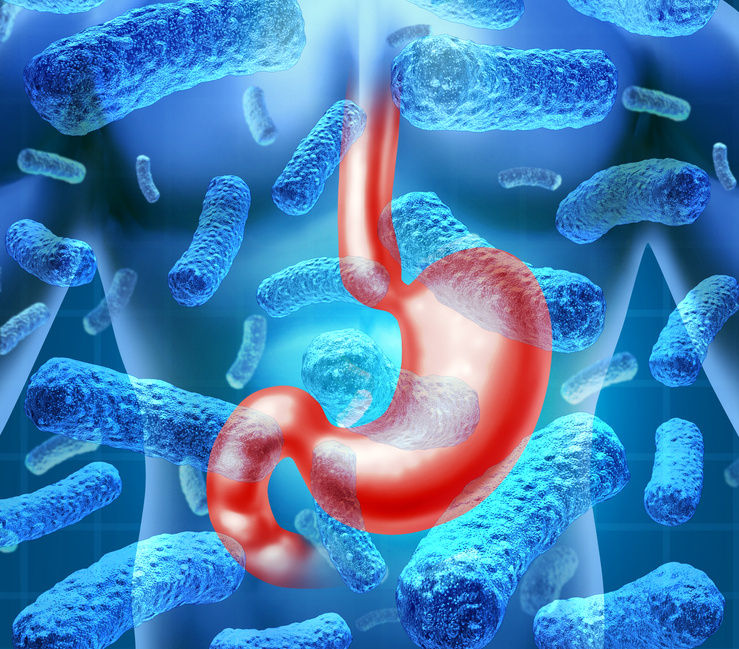Refractory GERD

Gastroesophageal reflux disease (GERD) is a condition in which the stomach contents (food or liquid) leak backwards from the stomach into the esophagus (the tube from the mouth to the stomach). This action can irritate the esophagus, causing heartburn and other symptoms.
MedStar Health doctors are skilled and compassionate when managing patients with GERD, or chronic heartburn. They offer comprehensive care that includes consultation, upper endoscopy and diagnostic pH testing. They also offer impedance pH testing, a catheter based study, which evaluates for both non-acid and acid reflux. Diagnostic pH testing may also be done through a wireless pH capsule that adheres to the lining of the esophagus 6 cm above where the stomach and esophagus meet.
Why Does GERD Occur?
When you eat, food passes from the throat to the stomach through the esophagus (also called the food pipe or swallowing tube). Once food is in the stomach, a ring of muscle fibers prevents food from moving backward into the esophagus. These muscle fibers are called the lower esophageal sphincter, or LES.
If this sphincter muscle doesn’t close properly, food, liquid and stomach acid can leak back into the esophagus. This is called reflux or gastroesophageal reflux. This reflux may cause discomfort and may even damage the esophagus.
Symptoms
The hallmark symptoms of GERD are:
Heartburn: a burning sensation in the chest and throat
Regurgitation: a sensation of acid backed up in the esophagus
Common symptoms are:
Feeling that food may be trapped behind the breastbone
Heartburn or a burning pain in the chest (under the breastbone)Increased by bending, stooping, lying down or eating
More likely or worse at night
Relieved by antacidsNausea after eating
GERD Diagnosis
If your symptoms are severe, recurrent, or ongoing for more than one year, one or more tests may help diagnose reflux or any complications:
• Esophagogastroduodenoscopy (EGD) is often used to examine the esophagus (swallowing tube) for damage. Biopsies can be taken to evaluate for cellular change. The doctor inserts a thin tube with a camera on the end through your mouth. The tube is then passed into your esophagus, stomach and small intestine.
• Barium swallow
• BRAVO ph esophageal pH monitoring
• Impedance pH monitoring
• Esophageal manometry
Treatment for GERD
Other over-the-counter and prescription drugs can treat GERD. They work more slowly than antacids but give you longer relief. Your doctor or nurse can tell you how to take these drugs.
• Proton pump inhibitors (PPIs) are the most potent acid inhibitors: omeprazole (Prilosec), esomeprazole (Nexium), lansoprazole (Prevacid), rabeprazole (AcipHex), and pantoprazole (Protonix)
• H2 antagonists: famotidine (Pepcid), cimetidine (Tagamet), ranitidine (Zantac) and nizatidine (Axid)
• Promotility agents: metoclopramide (Reglan)
If the diagnosis of GERD has been established through upper endoscopy, esophageal ph testing, and/or esophageal motility testing, then anti-reflux operations (Nissen fundoplication and others) may be considered. Surgery can also be an option for patients whose symptoms do not go away with lifestyle changes and medication. Heartburn and other symptoms should improve after surgery, but some drugs may be needed for heartburn.
To prevent heartburn, avoid foods and beverages that may trigger your symptoms. For many people, these include:
Alcohol
Caffeine
Carbonated beverages
Chocolate
Citrus fruits and juices
Tomatoes
Tomato sauces
Spicy or fatty foods
Full-fat dairy products
Peppermint and/spearmint
If other foods regularly give you heartburn, avoid those foods, too.
These changes also may help:
• Avoid bending over or exercising just after eating
• Avoid garments or belts that fit tightly around your waist
• Do not lie down with a full stomach
• Do not smoke
• Eat smaller meals
• Lose weight if you are overweight
• Reduce stress
• Sleep with your head raised about 6 inches. Tilt the bed or place a wedge (not pillows) under your body.
Over-the-counter antacids may be used after meals and at bedtime for temporary relief. Common side effects of antacids include diarrhea or constipation.
If symptoms persist call Gastrocure in West Orange, NJ at 973-736-1112 to schedule an appointment
